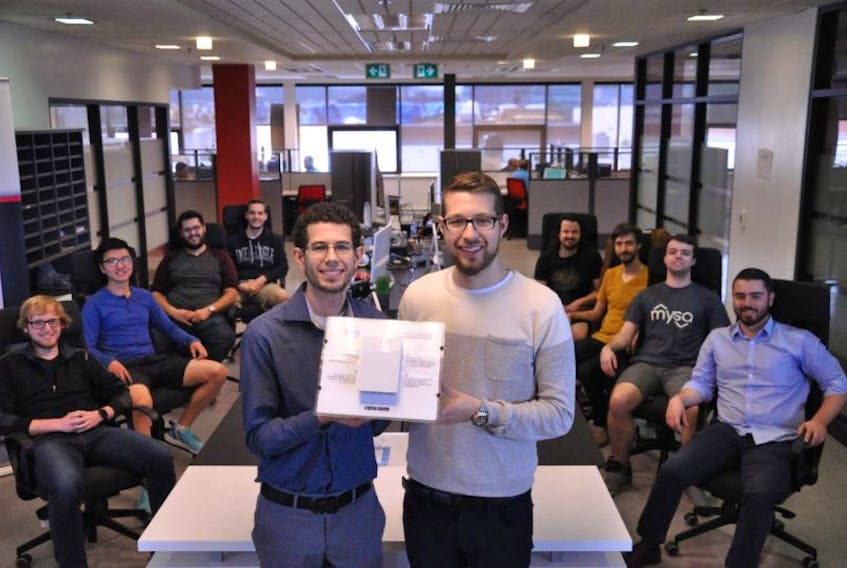The device, conceived and developed by St. John’s-based tech startup Empowered Homes, is a first of its kind in the smart thermostat game in that it is the only one that’s designed specifically for high-voltage heating systems using electric baseboard heaters, fan-forced heaters and in-floor heaters.
To date, the other big players such as Nest and Ecobee have focused solely on the larger market of low-voltage heating systems, predominantly furnaces, that are found in 90 per cent of North American homes, leaving programmable thermostats as the best available option for everyone else interested in reducing energy consumption and costs.
And that’s how CEO and co-founder Joshua Green, a mechanical engineer by trade, discovered the need for the Mysa.
“If I had just kind of waited for that perfect idea I don’t think I would have ever stumbled upon that idea,” says Joshua, who was joined by his brother, Zach, in founding the company.
While working as a self-employed energy auditor who would go into people’s homes and diagnose how they could save money on heating costs, Joshua found that people weren’t getting the most out of their expensive programmable thermostats because they were complicated, and anything on the market using smart technology wasn’t serving the electric heat market.
“It took being in Newfoundland to find the problem because he lived it,” explains Zach. “If you were down in Ontario, maybe only one in 10 homes you go into would have baseboard heating, so you wouldn’t recognize the pattern, but because you live here, where every other home has baseboard heating, you see that everyone keeps asking for this, but it’s not there.”
The Wi-Fi-enabled Mysa gives the user control over one heating point from the thermostat, through software on a phone or tablet, or a computer-based web app.
“Do you always want it to be super comfortable, which means that its number one priority is to keep you comfortable and energy savings is secondary?” Joshua says. “Or, if you really want to be extra eco-friendly, you can select eco-mode and it says my number one priority is to save energy. This may mean a few times when you come home your rooms might be a little bit cooler, but you can play with how aggressive you want the energy savings to be.”
Where the real saving can occur is in the artificial intelligence that uses learning algorithms and collected data to optimize heating schedules to produce the most energy savings.
“The learning is so they don’t have to think about it,” Joshua says. “They can just go on with their daily lives and the system is learning as they go and really optimizing and tailoring that heating schedule for their particular household.”
They’re also developing the software to be integrated with devices such as Google Home, Apple HomeKit and the Amazon Echo.
“We’ll be continually adding features to this, updating it over Wi-Fi, so your thermostat will get better over time. You’ll get more features, more integrations,” Joshua explains.
As electricity rates skyrocket in Newfoundland in the years to come, and with the vast majority of homes here using high-voltage electric heating systems, people in this province are going to be seeking more ways to increase their energy efficiency and save money, something that’s not lost on the Mysa founders.
“If you take a device at today’s electricity prices, it’s going to pay for itself in two years. Now, with the increased price, it could be one year, possibly even less than a year,” Joshua says of the device, which is selling for $100 during a pre-order period, but will increase to $120 later this year.
Unlike other devices for low-voltage systems that control the whole home, Mysa allows customers greater versatility in which areas of a home are under control.
“Rather than automate their whole home, they can do it a la carte,” explains director of marketing Andrew Murphy.
“You can retrofit 20 per cent of your home, 80 per cent of your home or your entire home.”
As of Tuesday morning, 233 people had pre-ordered 887 Mysas.
Manufacturing will take place in Ontario, with the first 1,000 devices ready to be shipped in October. They’re eyeing another production amount between 5,000 and 10,000 later on.
But not one of the pre-order customers has actually paid a penny for the device.
Rather than take the sometimes risky crowd funding route, Murphy and Zach built an e-commerce component directly into the product website and employed software called Celery — people order, but don’t pay until the product ships.
It not only gave the customer piece of mind, but helped attract investors.
“As soon as the investors saw that there was person after person and dozens of people and then hundreds of people putting their credit card information down to buy this device, that was all the traction they needed to see,” Joshua says.
This spring, the fledgling company got its greatest boost with a $600,000 investment from Killick Capital and Pelorus Venture Capital Ltd. The money enabled the company to staff up significantly and mitigated concern about the funds to meet production costs.
More than that, it gave them direct access to business partners with a wealth of experience.
“They’re really smart guys. They know the business world really well, so they’ve been excellent mentors,” Joshua says. “You’re all excited about this $600,000, but now several months into it also provides so much value when you have investors on your team.”
Other channels of funding and support have come through the non-profit organization Futurpreneur Canada, Atlantic Canada-based startup accelerator Propel ICT, the provincial government’s Research and Development Corp., the Atlantic Canada Opportunities Agency and the National Research Council of Canada through the Genesis Centre, Memorial University’s business incubator for tech companies.
“The Genesis Centre has been really instrumental to our success,” says Joshua. “Their support has been amazing.”
Just as important has been the young staff the Greens and Murphy, who was the first official hire, have built, all of them coming out of Memorial University.
“I don’t know if people really appreciate that there’s talent here and all of this talent doesn’t need to go up to Ontario. It doesn’t need to be funnelled into oil and gas. It can be used for some really cool, innovative products right here in Newfoundland.
“I’m really happy we employ 13 people in high-paying jobs in their field.”
To learn more about Mysa, visit getmysa.com.
Twitter: kennoliver79









